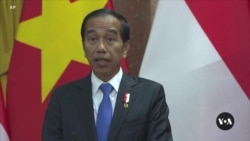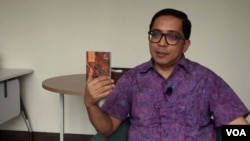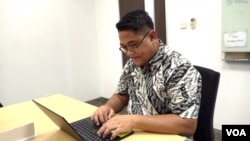As Indonesians prepare to go the polls for the country’s presidential election on Wednesday, the popular incumbent is coming under fire. Critics accuse President Joko Widodo, who can’t run for reelection due to term limits, of undermining democracy to extend his legacy.
"He’s creating an unfair playing field," said Yoes Kenawas, a research fellow at Atma Jaya Catholic University in Jakarta.
Widodo, widely known as Jokowi, is popular, with approval ratings often topping 70%, according to Philips Vermonte, dean of the Faculty of Social Sciences at Indonesian International Islamic University.
"He speaks plain language, which resonates with the people, plus the public likes his infrastructure projects," said Vermonte. "He’s built highways, ports, airports. We don’t know yet how effective some of them will be, but for the public, it’s something their eyes can see."
Widodo’s 36-year-old son, Gibran Rakabuming Raka, is now the vice presidential running mate of Prabowo Subianto, 72, the current defense minister who lost the presidential election to Widodo twice. Prabowo took a commanding lead in the polls for the upcoming election shortly after Gibran was named to the team in October. Approximately half of Indonesia’s eligible voters are younger than 40, and about a third are under 30.
"Prabowo wanted Gibran because he’s young, so it will help him attract younger voters, plus it will also help him get Jokowi’s supporters," said Vermonte.
"If Gibran becomes the vice president, the next five years will be the apprenticeship period for Gibran to build his political credentials, build his popularity among Indonesians, so in the future he can run as a president," said Kenawas. "That’s when Joko Widodo will have the guarantee that his legacy will be continued."
While in his 20s, Gibran opened a catering business and a chain of dessert shops before becoming mayor of Solo, a midsize city in Central Java, in 2021. His father was mayor of Solo from 2005 to 2012.
Gibran was able to run for vice president only after a ruling by the country’s Constitutional Court last year. The court amended the minimum age requirement of 40 for presidential and vice presidential candidates so that the restriction would not apply to anyone who had previously held elected public office. It was a 5-4 decision. The judge who cast the deciding vote was the court’s chief justice, Anwar Usman, who is Widodo’s brother-in-law and Gibran’s uncle, leading to accusations of corruption and nepotism.
Soon after, an ethics panel removed Anwar from his role as chief justice for not recusing himself from the proceedings. Despite the ruling, Anwar was able to remain as a judge on the Constitutional Court, and the court’s controversial decision on the age requirement stood.
"Of course, a president would want to see his legacy continue on," said Vermonte. "The complaint is the way it is done."
Some ordinary citizens have expressed their displeasure with the court’s ruling. "Gibran is allowed to run for office," said Alvin Gerard, a student at the University of Indonesia. "But changing the law this way is not ethical."
Kenawas accuses Widodo of undermining democracy. "The playing field is being tilted towards the advantage of the incumbents or those who are endorsed by the incumbents, and this is a bad precedent for the future of Indonesia’s democracy," he said. "Of course, supporting someone is not a taboo, but if the person enters the game by changing the law, by violating ethical principles, that will give a precedent to Indonesian politics in the future."
While Widodo has not officially endorsed any of the presidential candidates, political analysts say it’s clear to the public whom he supports.
"He’s not saying, 'I’m endorsing Prabowo,'" said Vermonte. "There’s a direct language and indirect language, and I think what is clear is naturally people see the connection."







